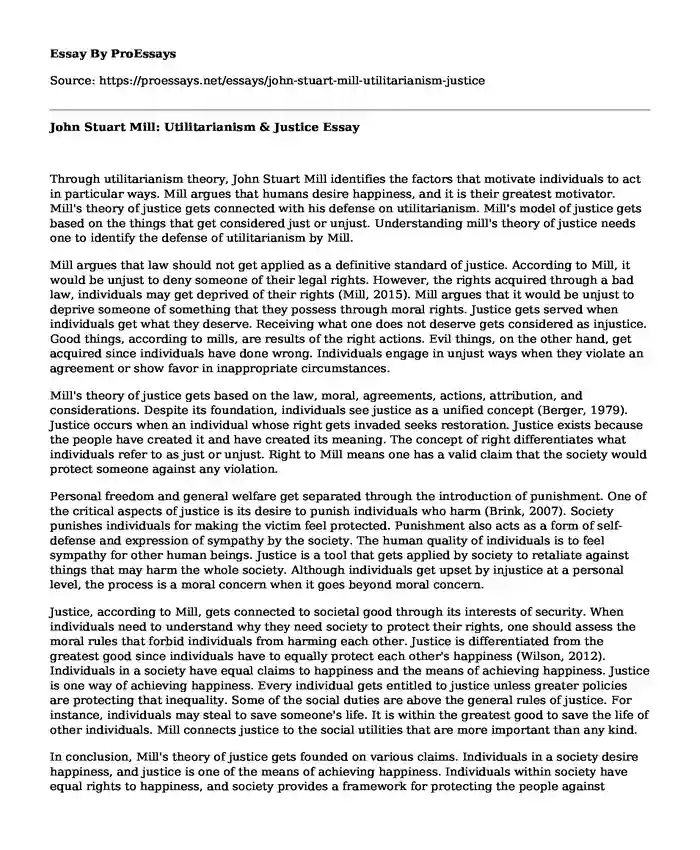Through utilitarianism theory, John Stuart Mill identifies the factors that motivate individuals to act in particular ways. Mill argues that humans desire happiness, and it is their greatest motivator. Mill's theory of justice gets connected with his defense on utilitarianism. Mill's model of justice gets based on the things that get considered just or unjust. Understanding mill's theory of justice needs one to identify the defense of utilitarianism by Mill.
Mill argues that law should not get applied as a definitive standard of justice. According to Mill, it would be unjust to deny someone of their legal rights. However, the rights acquired through a bad law, individuals may get deprived of their rights (Mill, 2015). Mill argues that it would be unjust to deprive someone of something that they possess through moral rights. Justice gets served when individuals get what they deserve. Receiving what one does not deserve gets considered as injustice. Good things, according to mills, are results of the right actions. Evil things, on the other hand, get acquired since individuals have done wrong. Individuals engage in unjust ways when they violate an agreement or show favor in inappropriate circumstances.
Mill's theory of justice gets based on the law, moral, agreements, actions, attribution, and considerations. Despite its foundation, individuals see justice as a unified concept (Berger, 1979). Justice occurs when an individual whose right gets invaded seeks restoration. Justice exists because the people have created it and have created its meaning. The concept of right differentiates what individuals refer to as just or unjust. Right to Mill means one has a valid claim that the society would protect someone against any violation.
Personal freedom and general welfare get separated through the introduction of punishment. One of the critical aspects of justice is its desire to punish individuals who harm (Brink, 2007). Society punishes individuals for making the victim feel protected. Punishment also acts as a form of self-defense and expression of sympathy by the society. The human quality of individuals is to feel sympathy for other human beings. Justice is a tool that gets applied by society to retaliate against things that may harm the whole society. Although individuals get upset by injustice at a personal level, the process is a moral concern when it goes beyond moral concern.
Justice, according to Mill, gets connected to societal good through its interests of security. When individuals need to understand why they need society to protect their rights, one should assess the moral rules that forbid individuals from harming each other. Justice is differentiated from the greatest good since individuals have to equally protect each other's happiness (Wilson, 2012). Individuals in a society have equal claims to happiness and the means of achieving happiness. Justice is one way of achieving happiness. Every individual gets entitled to justice unless greater policies are protecting that inequality. Some of the social duties are above the general rules of justice. For instance, individuals may steal to save someone's life. It is within the greatest good to save the life of other individuals. Mill connects justice to the social utilities that are more important than any kind.
In conclusion, Mill's theory of justice gets founded on various claims. Individuals in a society desire happiness, and justice is one of the means of achieving happiness. Individuals within society have equal rights to happiness, and society provides a framework for protecting the people against getting violated. Mill effectively addresses the faults that exist in utilitarianism by associating rights and justice. Rights get considered as aspects of justice that influence society to protect an individual by meeting the interests of security. The utmost good for the maximum number gets achieved when society has equal rights to happiness and means of achieving happiness.
References
Brink, D. (2007). Mill's moral and political philosophy. https://plato.stanford.edu/entries/mill-moral-political/#MilUtiBerger, F. R. (1979). John Stuart Mill on justice and fairness. Canadian Journal of Philosophy; Supplementary Volume, 5, 115. https://doi.org/10.1080/00455091.1979.10717097Mill, J. S. (2015). On Liberty, Utilitarianism, and other essays. Oxford University Press, USA. https://books.google.co.ke/books?hl=en&lr=&id=70K4CAAAQBAJ&oi=fnd&pg=PP1&dq=Utilitarianism%0AJohn+Stuart+Mill&ots=8mEHqvsHOd&sig=z2Txn3h01fg8xqj4twivv6Xo0ko&redir_esc=y#v=onepage&q=Utilitarianism%20John%20Stuart%20Mill&f=falseWilson, F. (2012). John Stuart Mill on Justice. In Mill on Justice (pp. 90-115). Palgrave Macmillan, London. https://link.springer.com/chapter/10.1057/9780230354975_5
Cite this page
John Stuart Mill: Utilitarianism & Justice. (2023, Oct 14). Retrieved from https://proessays.net/essays/john-stuart-mill-utilitarianism-justice
If you are the original author of this essay and no longer wish to have it published on the ProEssays website, please click below to request its removal:
- Cause and Effect Essay on Cold War
- Article Analysis Essay on Power of the Zoot
- Why the American Lost Trust in the Federal Government Since the 1960s? - Research Paper
- Procedure of Dealing With OSHA Inspector in Anderson Associates Paper Example
- Essay Example on Federalists vs. Anti-Federalists: The 1787 Constitution Dispute
- Essay Example on Comparing WWI & WWII: Causes & Effects on Global History
- Research Paper on Cold War: USSR vs US: Forty Years of Tension







